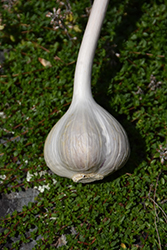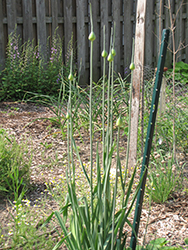>> Home
Plant Height: 12 inches
Flower Height: 24 inches
Spacing: 6 inches
Sunlight:
![]()
Hardiness Zone: 4a
Other Names: Cultivated Garlic
Description:
A bulbous member of the onion family grown primarily as an annual in herb and vegetable gardens for its segmented bulbs that are used in cooking; globular flower clusters on long stalks in mid spring are quite showy
Edible Qualities
Garlic is a perennial vegetable plant that is typically grown for its edible qualities, although it does have ornamental merits as well. It produces white round tubers which are harvested in late summer. The tubers have a potent taste and a distinctive fragrance.
The tubers are most often used in the following ways:
- Cooking
- Seasoning
- Sauces
Planting & Growing
Garlic will grow to be about 12 inches tall at maturity extending to 24 inches tall with the flowers, with a spread of 12 inches. When planted in rows, individual plants should be spaced approximately 6 inches apart. It grows at a fast rate, and under ideal conditions can be expected to live for approximately 5 years. As an herbaceous perennial, this plant will usually die back to the crown each winter, and will regrow from the base each spring. Be careful not to disturb the crown in late winter when it may not be readily seen! As this plant tends to go dormant in summer, it is best interplanted with late-season bloomers to hide the dying foliage.
This plant can be integrated into a landscape or flower garden by creative gardeners, but is usually grown in a designated vegetable garden. It should only be grown in full sunlight. It does best in average to evenly moist conditions, but will not tolerate standing water. It is not particular as to soil pH, but grows best in rich soils. It is highly tolerant of urban pollution and will even thrive in inner city environments. This species is not originally from North America. It can be propagated by division.
Garlic is a good choice for the vegetable garden, but it is also well-suited for use in outdoor pots and containers. With its upright habit of growth, it is best suited for use as a 'thriller' in the 'spiller-thriller-filler' container combination; plant it near the center of the pot, surrounded by smaller plants and those that spill over the edges. Note that when growing plants in outdoor containers and baskets, they may require more frequent waterings than they would in the yard or garden. Be aware that in our climate, most plants cannot be expected to survive the winter if left in containers outdoors, and this plant is no exception. Contact our experts for more information on how to protect it over the winter months.
This plant is not reliably hardy in our region, and certain restrictions may apply; contact the store for more information.

